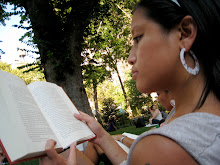







I write. I read. I edit. I love music. I live in New York. These are my thoughts on all of the above - and then some.

 A Fraction of the Whole is, in essence, the quirky saga of Martin Dean and his son Jasper. Martin is a professed misanthrope, railing against anything and everything, but especially against the institution that is society. He has serious hang-ups about his brother Terry, who was revered by the general public as first a sports star and then an infamous murderer. Martin's gripes with life are passed down to his son Jasper who grows up struggling to be his own person, but finding it basically impossible with his father's constant diatribes poisoning his independent thought.
A Fraction of the Whole is, in essence, the quirky saga of Martin Dean and his son Jasper. Martin is a professed misanthrope, railing against anything and everything, but especially against the institution that is society. He has serious hang-ups about his brother Terry, who was revered by the general public as first a sports star and then an infamous murderer. Martin's gripes with life are passed down to his son Jasper who grows up struggling to be his own person, but finding it basically impossible with his father's constant diatribes poisoning his independent thought.